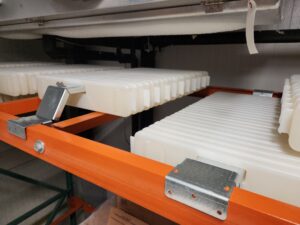
Grand Rapids, Michigan – [July 16, 2025] – In a step toward sustainability and energy resilience, Kids’ Food Basket, in collaboration with Michaels Energy and with a rebate from Consumers Energy, has successfully installed a cutting-edge thermal energy storage system in its walk-in freezer.
At the center of this innovation is IceRack™, Michaels Energy’s proprietary thermal energy storage solution. By storing cooling energy during off-peak hours, IceRack™ enables the freezer to maintain low temperatures more efficiently—while dramatically reducing energy use during costly mid-day peak periods. Since this solution is manufactured in the US, Kids’ Food Basket can take advantage of the Investment Tax Credit, further reducing the cost of the project.
“We’re grateful to Michaels Energy and Consumers Energy joining us on our journey toward sustainability,” said Austin Roelofs, Vice President of Programming at Kids’ Food Basket. “Their expertise and commitment have been instrumental in helping us reduce our carbon footprint and build a greener future together. This collaboration will not only support our sustainability goals but will allow us to save critical financial resources to better serve our community.”
The benefits of the IceRack™ installation are both environmental and financial.
- Efficient Load Shifting: Stores cooling energy overnight, reducing reliance on high-demand electricity during the day.
- Enhanced Freezer Efficiency: Up to 20% efficiency gain lowers strain on refrigeration systems, increasing reliability.
- Environmental Impact: Expected to cut more than 12.8 metric tons of CO₂ annually—the equivalent of removing 3 gas-powered cars from the road for a year.
- Cost Savings: Projected to save over $3,000 annually, allowing the nonprofit to redirect those funds to feed more children.
This project exemplifies the synergy between innovation and community service, showing how forward-thinking energy solutions can strengthen mission-driven organizations.
“IceRack™ is designed to work quietly behind the scenes to lower bills, reduce emissions, and turn energy savings into something truly powerful—more meals for kids,” said Stan Nabozny, Director of Energy Solutions at Michaels Energy. “We are deeply grateful to Kids’ Food Basket for their leadership in both the environment and the well-being of children. Because of this project, 1,500 more nourishing meals will be served every year—and that’s energy efficiency doing its best work.”

Left to Right: Seth Epstein, Consumers Energy; Austin Roelofs, Kids’ Food Basket; Stan Nabozny and Jonny Kendrick, Michaels Energy

IceRack system installed on top of the storage racks. This system can provide up to 8 hours of cooling while equipment is turned off during peak electric usage during the day.
________________________________________
About Kids Food Basket
Kids’ Food Basket (KFB) was founded to nourish children to reach their full potential. We are a community-based food equity nonprofit supporting our West Michigan neighbors in Kent, Muskegon, Ottawa and Allegan counties who are under-resourced and impacted by poverty and food insecurity. Our services include our flagship Sack Supper program, sustainable farming, community food distribution and educational programming. Kids’ Food Basket is now serving about 11,000 weekday evening meals to 61 schools in four counties. We work toward a future in which all children have access to the nourishment that fosters their lifelong health and limitless potential. To learn more about KFB’s programs, services, and how you can make a difference, please visit kidsfoodbasket.org.
About Michaels Energy
Michaels Energy is a national leader in energy management and sustainability solutions. From utility programs to custom-engineered thermal storage like IceRack™, Michaels delivers innovative ways to reduce energy costs and carbon impact. Learn more about Michaels at MichaelsEnergy.com.
About Consumers Energy
Consumers Energy is Michigan’s largest energy provider, providing natural gas and/or electricity to 6.8 million of the state’s 10 million residents in all 68 Lower Peninsula counties.
________________________________________
